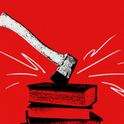© Graham Clark
Here goes. The big and pressing issues would be delegated (one can’t do everything, even with this sort of power). The issues of climate change and the world’s financial system would be dealt with by a panel of experts. Planning and architecture would be the responsibility of Professor Christopher Alexander, author of the architectural classic, A Pattern Language, who understands humane architecture and would be given wide authority to demolish the inhuman phallic symbols created by modernist architects (the buildings in question know who they are.) New buildings would be on a human scale, and relate to the other buildings near them. Big statements of architectural ego would be discouraged.
Now to the real business in hand: education and the arts. Education is a good thing. You might think that this hardly requires to be said, but there are plenty of people who view education as a form of technical training designed to fit you for a job. It is so much more than that; the acquisition of knowledge and wisdom is an end in itself. It enriches our lives. And it should be within the reach of everybody who wants it. I would seek to reintroduce that great good that we had in the UK and that we somehow lost: the grant system that enabled people to have a tertiary education without ending up with massive debt. A graduate tax would pay for it: if you have an education courtesy of the state then you pay slightly higher income taxes throughout your working life. That would not be crippling—it would probably be the cost of a cup of Starbucks coffee a day.
Universities would be encouraged to behave like universities and re-introduce recognisable titles such as “Dean” and “Head of Department.” I saw a university lecturer described the other day as the “lead” in a certain subject; I have also heard of students being described in a planning document as “units.” Orwellian doublespeak would be rooted out and exposed for what it is.
Control of universities would be wrested back from the bureaucrats and handed to those who would run them on collegiate lines. This would be a celebration of that endangered concept: democracy. Similarly, I would hand the hospitals back to doctors and nurses. Parking at hospitals would be free for employees, and for the seriously ill, rather than charged at exorbitant rates. Matron would be reintroduced as a matter of urgency. When we had matron, we had clean hospitals in which people slept in well-made beds rather than on trollies. Nurses actually nursed, rather than filled in forms. Matron would, of course, resemble the late Hattie Jacques in as many respects as possible. Doctors would be left to act according to medical conscience. (Reactionary? No! Radical.)
Not everybody should be urged to go to university. We would give great support for technical education in the form of apprenticeships. The dignity of these callings would be enhanced, and people with technical skills would be admired more than those whose skill consists in moving money around.
Teachers, too, would have their authority returned to them. Children would be taught grammar, and in particular encouraged to use the accusative case correctly and to put verbs in their sentences where possible. They would be told what a verb is. They would be taught not to use the word “like” every 10 seconds. They would be taught not to run alltheirwordstogether. This would mean that when they got jobs announcing flights at airports people would be able to understand what they were saying.
Public broadcasting would undertake what it really should do, which is to provide quality programmes of intellectual and artistic value. That would not preclude light-ish entertainment, but it would prevent the spending of public money on game shows, reality television, and ridiculously high salaries for certain television personalities. Audience figures would not be the standard of judgement: that is not what public broadcasting is about. I would protect the licence fee. The BBC is a great good, even if it has lost its way in some respects.
I’m afraid that art colleges would face some scrutiny. It is very difficult for young artists to get training in drawing and painting because these subjects have been treated with derision by those in favour of conceptual art. As a result, most graduates of art colleges are incapable of drawing, which, as David Hockney has reminded us, is one of the basic building blocks of artistic creation.
All of the above, it seems to me, are courses of action available to our current rulers. The ball is in their court, but I suspect we should not hold our breath.













